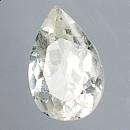|
Click on a letter above to view the list of gems. |
|
|
|
|
|
|
|
|
Periclase |
|
| | |
| Discovered in 1840; IMA status: Valid (pre-IMA; Grandfathered). | ||
|
| ||
|
Chemistry |
| |||||||||||||||
|
| ||||||||||||||||
|
MgO | ||||||||||||||||
|
|
Magnesium Oxide | |||||||||||||||
|
Molecular Weight: |
40.30 gm | |||||||||||||||
|
Composition: |
| |||||||||||||||
|
|
||||||||||||||||
|
|
|
Classification |
|
|
| |
|
Oxides | |
|
4/A.04-10 | |
|
|
4 : OXIDES (Hydroxides, V[5,6] vanadates, arsenites, antimonites, bismuthites, sulfites, selenites, tellurites, iodates) |
|
Related to: |
Periclase Group. Periclase - Murdochite Series. Isostructural with Halite. |
|
Varieties: |
Ferropericlase, Lavernite |
|
Synonyms: |
Periclasa, Periclasia, Periclasite |
|
|
|
|
Crystal Data |
|
|
|
|
|
As small octahedra, less commonly cubo-octahedra or dodecahedra, may be clustered; granular, massive. |
|
|
None |
|
|
|
|
|
Physical Properties |
|
|
|
|
|
[001] Perfect, [111] Imperfect; may exhibit parting on [011] |
|
|
Irregular/Uneven, Conchoidal |
|
|
Brittle |
|
|
5.5 |
|
|
3.56 - 3.68 (g/cm3) |
|
|
Light Yellow under LW UV |
|
|
Not Radioactive |
|
|
Other: |
Slightly soluble in water when powdered, to give an alkaline reaction |
|
|
|
|
Optical Properties |
|
|
|
|
|
Colorless, Grayish White, Yellow, Brownish Yellow; may be Green or Black with inclusions; Colorless in transmitted light. |
|
|
Transparent to Translucent |
|
|
Vitreous |
|
|
1.735 - 1.745 Isotropic |
|
|
0.00 (Isotropic) |
|
|
Relatively Strong |
|
|
None |
|
|
|
|
|
Occurances |
|
|
|
|
|
Geological Setting: |
A product of the high-temperature metamorphism of magnesian limestones and dolostone. |
|
Common Associations: |
Forsterite, Magnesite (Monte Somma, Italy); Brucite, Ellestadite, Hydromagnesite (Crestmore quarry, California, USA); Anhydrite, Fluorellestadite, Hematite, Lime, Magnesioferrite, Srebrodolskite, (Kopeysk, Russia). |
|
Common Impurities: |
Fe |
|
Type Locality: |
Monte Somma, Somma-Vesuvius Complex, Naples Province, Campania, Italy |
|
Year Discovered: |
1840 |
|
View mineral photos: | |
|
|
|
|
More Information |
|
|
|
|
|
| |
|
|
|
|
There
are a number of locations for finding Periclase but
facet grade crystals may only be available from the
Ronneburg U deposit, Gera, Thuringia, or the Lichtenberg Absetzer Mine (dump), Ronneburg U deposit, Gera, Thuringia, Germany. |
|
|
We
have not photographed our Periclase gems. Please
check back soon. |

